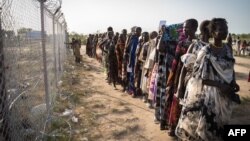The United Nations warns a record 7.74 million people, or two-thirds of South Sudan’s population, are likely to face hunger during this year’s lean season between May and July. This is the dangerous period between planting and harvesting when food stocks are at their lowest.
Among the millions at risk of hunger are an estimated 87,000 people who will face catastrophic levels of acute food insecurity during the lean period.
A U.N. analysis of the food situation in South Sudan released last week warns many of these people will likely die of starvation.
This, said the U.N. Food and Agriculture Organization representative in South Sudan, Meshack Malo, is because they will have run out of coping options to feed themselves and their families.
“That can only be remedied by urgent and sustained humanitarian assistance in order to save lives and to re-establish livelihoods so that it can see them through to the next harvest season,” he said.
Speaking from the capital Juba, Malo said among those most at risk are some 1.34 million severely malnourished children. He said 676,000 pregnant and lactating women also are expected to be malnourished this year and are in need of special nutritional treatment.
The key drivers of food insecurity and extreme hunger in South Sudan include climate shocks. The country has experienced three consecutive years of heavy flooding, interspersed with periods of drought. This has badly impacted peoples’ ability to cultivate their land and prevent loss of livestock.
Malo said ongoing conflict, high food prices, and poor access to basic services also have contributed to the dire situation in the country.
“These have been compounded by the low crop production and livestock diseases that have continued to deplete the household coping strategies because of the protracted crisis that has shrunk the income opportunities available in the country,” he said.
At the heart of this crisis, Malo said, is the lack of peace. South Sudan endured a civil war that officially ended a few years ago but parts of the country remained wracked with violence.
The FAO representative said investing in peace will pay huge dividends. It would, he noted, provide people with the space and time to build the resilience needed to prevent households from falling back into a state of severe hunger.




